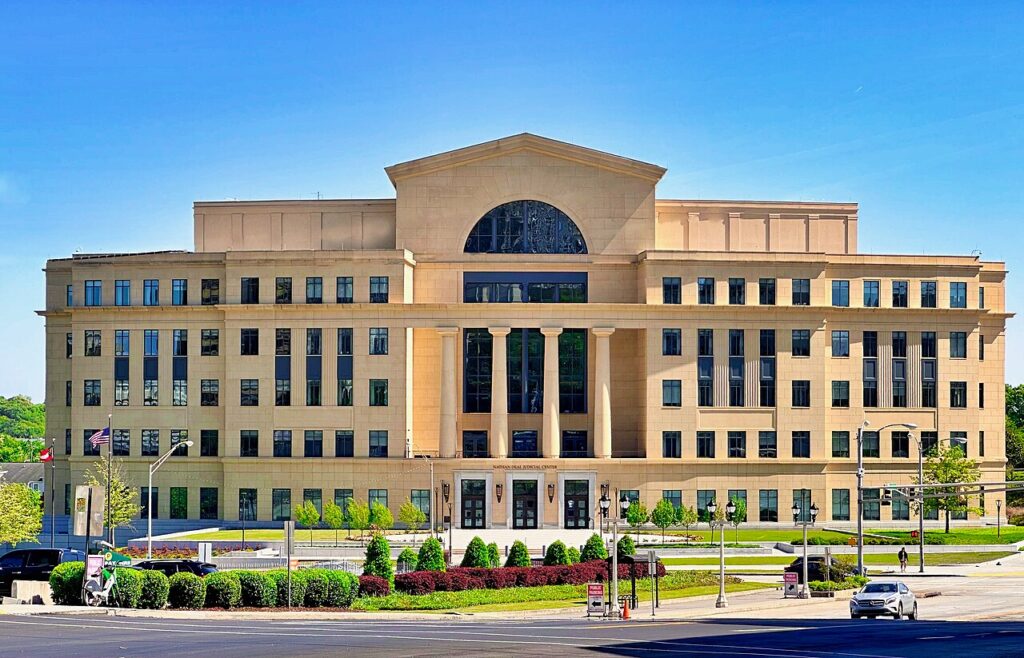
The Supreme Court of Georgia is located at the Nathan Deal Judicial Center in Atlanta. Credit: Wikimedia Commons.
From staff reports
LAWRENCEVILLE, Ga. | Gwinnett County this week sued the state of Georgia and three state legislators in an effort to stop the recently ratified city of Mulberry, which was approved by 57 percent of Mulberry voters earlier this year. It is the first time in recent memory that a metro Atlanta county has sued over the creation of a city in its boundaries.
Meanwhile late Monday – to add to the complexity of the situation – the Georgia Supreme Court said won’t hear a separate Mulberry challenge. The high court ruled unanimously late Monday in favor of Citizens for Mulberry, a group advocating for the new city, by holding that the court will not cancel the Mulberry city council elections in November.
Per the Supreme Court’s ruling, if plaintiff Stephen Hughes wishes to continue his legal challenge of the city of Mulberry, he may only challenge a Gwinnett County Superior Court judge’s “standing” ruling against him in the lower appellate court.
Michael Coker, president of Citizens for Mulberry, said, “This marks another victory for our legal team at Citizens for Mulberry. We will continue to fight and win in courts across Georgia to protect our city and your vote.”
New county suit comes as election approaches
The turn of a new county lawsuit about Mulberry comes with less than a month before Mulberry residents are to vote on members of the new city council.
A spokesman for Gwinnett County would make no comment, citing pending litigation.
A release from those wanting to form a new City of Mulberry, however, told details of the recent action. Note: the release contains political viewpoints. It reads as follows:
Despite having four prior lawsuits against Mulberry dismissed by Superior Court Judge Tadia Whitner, Gwinnett County and Harris Roth, a Mulberry District 4 council candidate, have decided to continue the pointless charade of wasting our citizens’ tax dollars and have filed four more lawsuits against the State of Georgia and the Governor’s Mulberry Transition Team.
Two suits were filed by Gwinnett in Fulton County and Gwinnett County, asking judges in both counties to stop the City of Mulberry and halt the ongoing transition. Unhappy with the prior rulings against them, Gwinnett County is using tax dollars to sue its own citizens in multiple courts in hopes of finding a new judge who will listen to their sham arguments. Every citizen of Gwinnett County should be outraged. This is all about power and control, and with some of the highest property tax rates in Georgia, Gwinnett will continue to spend our money to keep both.
“Gwinnett County’s willingness to weaponize the legal system in an attempt to overturn and subvert the will of their voters is exactly why we need the City of Mulberry – to protect local control in our community,” said Citizens for Mulberry President Michael Coker.
District 4 council candidate Harris Roth has also filed two additional lawsuits in Gwinnett seeking to stop Mulberry. Mr. Roth is suing the same city that he is asking to represent, using the same attorneys who represented Steve Hughes’ failed lawsuit to have this fall’s council election canceled. The hypocrisy is mind blowing.
“Now, more than ever, the need for strong leadership on our future city council is clear. Electing candidates who have been committed to Mulberry from the beginning is of the utmost importance,” said Citizens for Mulberry President Michael Coker. “We cannot have candidates on the council who are working with and for developers to sabotage this place we call home. I encourage you to research your candidates fully, and only vote for those that you know are committed to making Mulberry a success on day one.”
Citizens for Mulberry President Michael Coker and the Governor’s Mulberry Transition Team are committed to continuing to stand up for Mulberry’s residents in court and will fight these frivolous county and developer lawsuits until the city can officially be up and running on January 1, 2025.
- Have a comment? Click here to send an email.









Follow Us